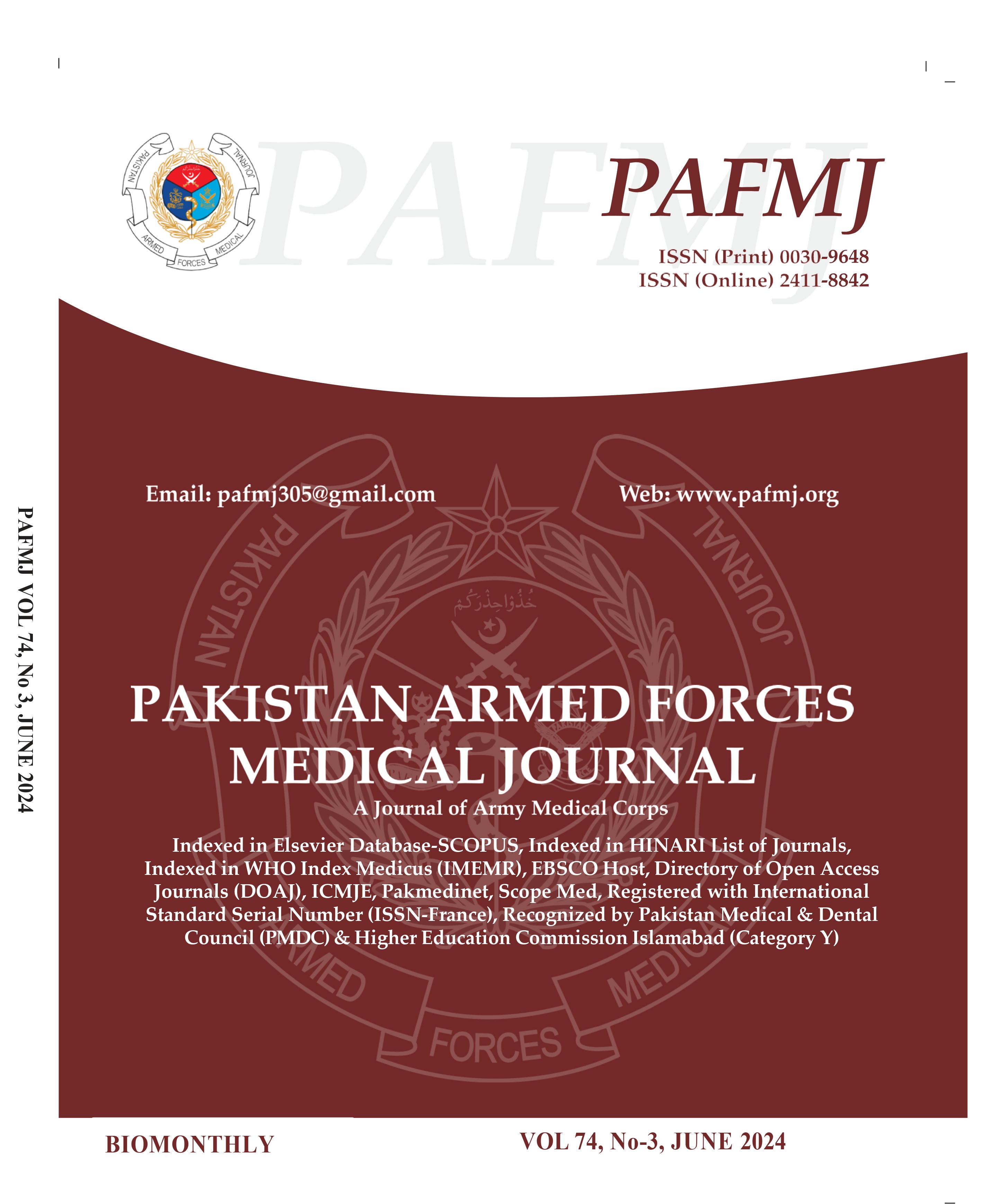Relationship between Recurrent Laryngeal Nerve Diameter and Body Mass Index for Preoperative Prediction of Nerve Size in Thyroidectomy
DOI:
https://doi.org/10.51253/pafmj.v74i3.9452Keywords:
Body Mass Index, Recurrent Laryngeal Nerve, ThyroidectomyAbstract
Objective: To study the correlation between recurrent laryngeal nerve diameter and Body Mass Index for preoperative prediction of nerve size in thyroidectomy.
Study Design: Cross-sectional study.
Place and Duration of Study: ENT Department, Combined Military Hospital, Rawalpindi Pakistan, from Jul 2021 to Jul 2022.
Methodology: Patients of either gender aged above 25 and below 80 years who had undergone open thyroidectomies, had malignancies and revision surgery with normal cords were included. Body Mass Index was measured preoperatively, and recurrent laryngeal nerve diameter was measured per operatively after meticulous dissection. RLN was exposed by tracking the inferior thyroid artery and traced along its total course. RLN diameter was measured using Castroviejo caliper. Postoperative examination was performed by an Otolaryngologist with the help of an Anesthesiologist for the assessment of vocal cord functions.
Results: Sixty individuals were included in the study. The male-to female ratio was 1:3, the mean age was 45.00±12.22 years, mean height and BMI was 164.55±5.02 cm and 26.59±2.16 kg/m2 respectively. Mean diameter of right and left recurrent laryngeal nerve was 1.46+0.20 mm and 1.71±0.20 mm. Pearson correlation showed a positive and statistically significant relationship between BMI and RLN diameter (r=0.748 right RLN, r=0.812 left RLN, p=0.001). Male candidates had thicker recurrent laryngeal nerve diameters than females on either side.
Conclusion: Body Mass Index has a strong positive correlation with diameter of the recurrent laryngeal nerve and can be used as preoperative tool to measure the size of recurrent RLN in thyroid surgeries.
Downloads
References
Wu KT, Chan YC, Chou FF, Wu YJ, Chi SY. Association between recurrent laryngeal nerve calibre and body figure: A preoperative tool to assess thin-diameter nerves in thyroidectomy. World J Surg 202044(9): 3036-3042.
https://doi.org/10.1007/s00268-020-05549-4
Hemmaoui B, Bouaiti EA, Sahli M, Errami N, Moumni M, Benchafai I, et al. Le nerf laryngé inférieur: considérations anatomiques et chirurgicales à propos de 60 thyroïdectomies. Pan Afr. Med. J 2019; 33(1).
https://www.doi.org/10.11604/pamj.2019.33.58.14271
Ghosh A, Chaudhury S. Cadaveric measurements of the left recurrent laryngeal nerve, ligamentum arteriosum, aortic arch, and pulmonary artery in the thorax with clinical implications and comparison between two sexes in the American Population. Cureus 2019 ;11(6): 4828. https://doi.org/ 10.7759/cureus.4828
Ng C, Woess C, Maier H, Schmidt VM, Lucciarini P, Öfner D, et al. Nerve at risk: anatomical variations of the left recurrent laryngeal nerve and implications for thoracic surgeons. Eur J Cardiothorac Surg 2020; 58(6): 1201-1205.
https://doi.org/10.1093/ejcts/ezaa258
Masuoka H, Miyauchi A. Intraoperative Management of the Recurrent Laryngeal Nerve Transected or Invaded by Thyroid Cancer. Front Endocrinol 2022; 13.
https://doi.org/10.3389/fendo.2022.884866
Zhao ZL, Wei Y, Peng LL, Li Y, Lu NC, Yu MA. Recurrent Laryngeal Nerve Injury in Thermal Ablation of Thyroid Nodules-Risk Factors and Cause Analysis. J Clin Endocrinol Metab 2022; 107(7): e2930-e2937.
https://doi.org/10.1210/clinem/dgac177
Ahmed M, Aurangzeb AS, Boota M, Ashfag M, Rashid AZ, Qureshi MA, et al. Should we routinely expose recurrent laryngeal nerve (s) during thyroid surgery. J Coll Physicians Surg Pak 2013; 23(3): 186-189.
Serpell JW, Lee JC, Yeung MJ, Grodski S, Johnson W, Bailey M. Differential recurrent laryngeal nerve palsy rates after thyroidectomy. Surgery 2014; 156(5): 1157-1166.
https://doi.org/10.1016/j.surg.2014.07.018
Jatzko GR, Lisborg PH, Müller MG, Wette VM. Recurrent nerve palsy after thyroid operations--principal nerve identification and a literature review. Surgery 1994; 115(2): 139-144.
Vural V, Comcali B, Saylam B, Coskun F. Identification of the recurrent laryngeal nerve during thyroidectomy can affect the complication rate. Ann Ital Chir 2021; (10): 217-226.
Wu R, Zhang C, Wang H, Li M, Lei S, Zeng J, et al. Clinical observation of end-to-end neuroanastomosis in the treatment of complete injury of the unilateral recurrent laryngeal nerve. Gland Surg 2020; 9(6): 2017.
https://doi.org/10.21037%2Fgs-20-633
Fujimoto D, Taniguchi K, Kobayashi H. Intraoperative neuromonitoring during prone thoracoscopic esophagectomy for esophageal cancer reduces the incidence of recurrent laryngeal nerve palsy: a single-center study. Updates Surg 2021; 73(2): 587-595. https://doi.org/10.1007/s13304-020-00967-4
Wang X, Guo H, Hu Q, Ying Y, Chen B. Efficacy of Intraoperative Recurrent Laryngeal Nerve Monitoring During Thoracoscopic Esophagectomy for Esophageal Cancer: A Systematic Review and Meta-Analysis. Front Surg 2021; 8.
https://doi.org/10.3389/fsurg.2021.773579
Fullmer T, Wang DC, Price MD, LeMaire SA, Coselli JS, Gregorio Casar J, et al. Incidence and treatment outcomes of vocal fold movement impairment after total arch replacement. Laryngoscope 2019; 129(3): 699-703.
https://doi.org/10.1002/lary.27347
Jin QF, Fang QG, Qi JX, Li P. Impact of BMI on complications and satisfaction in patients with papillary thyroid cancer and lateral neck metastasis. Cancer Control 2019; 26(1).
https://doi.org/10.1177/1073274819853831
Pradeep PV. Scar satisfaction assessment after conventional thyroidectomy: follow-up results. Acta Otorhinolaryngol Ital 2021;41(1):39-42. https://doi.org/
https://doi.org/10.14639%2F0392-100X-N1141
Boog GH, Kasmirski JA, Hojaij FC. Conventional thyroidectomy: what is the impact of the scar on the lives of operated patients? Arch Endocrinol Metab 202; 65: 265-268.
https://doi.org/10.20945/2359-3997000000379
Caulley L, Johnson-Obaseki S, Luo L, Javidnia H. Risk factors for postoperative complications in total thyroidectomy: a retrospective, risk-adjusted analysis from the National Surgical Quality Improvement Program. Medicine 2017; 96(5).
https://doi.org/ 10.1097/MD.0000000000005752
O’Neill RJ, Abd Elwahab S, Kerin MJ, Lowery AJ. Association of BMI with Clinicopathological Features of Papillary Thyroid Cancer: A Systematic Review and Meta-Analysis. World J Surg 2021;45(9):2805-2815.
Downloads
Published
Issue
Section
License
Copyright (c) 2024 Muhammad Sarfraz, Asif Alam Gul, Umer Asim, Shahid Farooq, Naeem Riaz, Imran Yaseen

This work is licensed under a Creative Commons Attribution-NonCommercial 4.0 International License.















